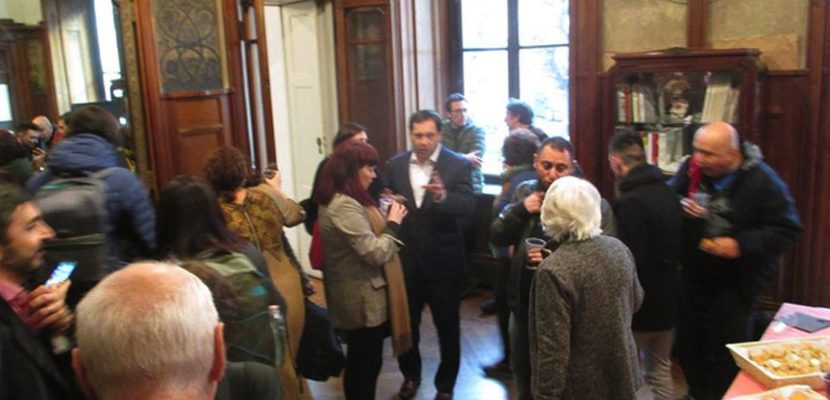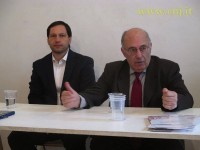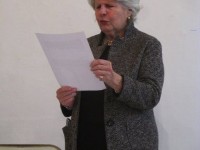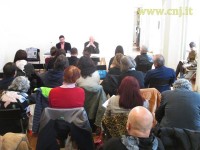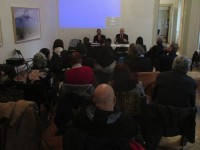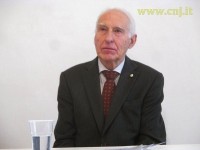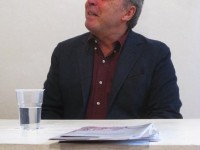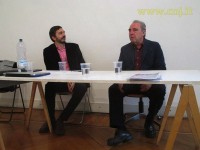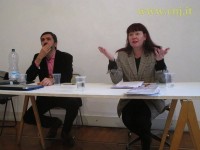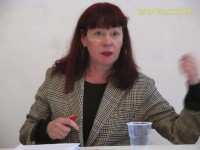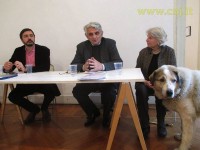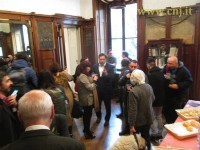Report of the Closing Event of the “Torre” Competition 2018
The first edition of the “Giuseppe Torre” contest for essays on the Hague “ad hoc Tribunal” was ended by a meeting hold, together with the winners, on Saturday, 1 December 2018, at the “Galleria Milano”
The initiative, which was public but with restricted access given the limited capacity of the location and the nature of the meeting, was attended by about twenty people in addition to the winners and the speakers which were foreseen by the program, and was crowned by a pleasant convivial moment around the buffet. In this page we report two “official” speeches and a selection of photographs
ANDREA MARTOCCHIA: INTRODUCTION
Today’s meeting is the first public event in the series of initiatives that our association, Coordination for Yugoslavia [Jugocoord], launched on the issue of the Hague-based “ad hoc Tribunal” established the for crimes committed on the territory of the former Jugoslavia (ICTY).
We launched this contest just while the “ad hoc Tribunal” was officially closing its doors and “transferring” its papers to a new “ad hoc” institution – the so-called United Nations’ International Residual Mechanism for Criminal Tribunals – which continues with writing the recent Balkan history for the ‘use and consumption’ of Western powers. There was no doubt that the “Mechanism” would have continued like that, since the new institution is a photocopy of the “ad hoc Tribunal”, helding the same staff (with President Meron as first) and at the very same seat in The Hague. In addition, the “Mechanism” is working also on the propaganda legacy of the “ad hoc Tribunal,” especially through the creation of “Information centers on ICTY” where the huge amount of documentation produced in 25 years’ ICTY activity is appropriately selected – better say: distilled – and made available to guide students, scholars, journalists and politicians. For example, one of these Centers was opened in the Town Hall of Sarajevo, but I’ve heard of installations, maybe temporary, also in Pula (Istria) and Vienna; they definitely aim at opening one Center in each Yugoslav Republic.
Therefore the topic of the “ad hoc Tribunal” remains a current one, and essential indeed for those who want to dedicate themselves to the interpretation of the contemporary Yugoslav crisis. Moreover, this competition as well as our further initiatives on the issue are not only the result of our desire to shed light on the uses and abuses of International Law: they are also a specific task entrusted to us by our supporter Giuseppe Torre, who died in 2014, who assigned to Jugocoord a part of his legacy to this purpose. In his Testament, dating back to 2007, it is written:
To the National Coordination for Yugoslavia I demand to use this amount to defend the Serbs accused at the Special Court in The Hague and to inform the public on what really this institution is: an insult to law, justice and the sense of humanity, created by the victors as a corollary and integral part of their wars.
Even more precisely Torre expressed his ideas about the “ad hoc Tribunal” in his 2006 article, where he wrote:
One aspect of the humanitarian wars is the use of justice, which is bent by the victors as an instrument of their new strategies. (…) This is why the special court of The Hague for the crimes in the former Yugoslavia was created – an actual instrument of war, that makes a clean sweep of both International Law and the basic principles of the European legal systems. It recently returned to us, rather than a judgment, the corpse of Slobodan Milosevic. The trial of the century, which had to make his responsibilities irrefutable, was soon done away, and finally the accused has been done away, too.
Regarding the Milosevic trial, you will see later some excerpts from a 2003 documentary by Dutch filmmaker De Putter; then, as well as during the debate, we may get the opportunity to talk about that again.
Here I want instead to note that the establishment of the “ad hoc Tribunal” and its way of working were the most striking, although certainly not the only, examples of manipulation, distortion, demolition of International Law as codified after the victory on nazi-fascism, in the context of the war for the destruction of Yugoslavia; a war that on this – and on so many other issues as well – was the prototype for the methods of aggression against sovereign States implemented after the end of the Cold war.
Among other examples of attack against the International Law I like here to recall, in particular, the unilateral recognition of “States” outside the UN framework. Astonishingly, it was given the faculty to European Union member States to recognize the “independence” of the “Republic of Kosovo” although there was no unanimity about this in the Union itself, so much so that even today at least 5 member states do not recognize it.
However, in hindsight, no formal justice is possible on specific matters relating to the Yugoslav disaster, if you not proceed first of all at prosecuting the highest responsibles for the crimes which lie at the roots of this tragedy, i. e. the crimes committed against peace. As codified in the Statute of the so-called Nuremberg Tribunal, “crimes against peace” are committed also by those who foment civil strife in another State, as well as by those who meddle in its internal affairs.
About all this and much more will definitely speak our guests today, starting with the two winners of the first round of the competition that we named after Giuseppe Torre, that is Stephen Karganovic and Jovan Milojevich. Afterwards, four invited speakers will take the floor: General Giorgio Blais, layer Tiphaine Dickson, dr Massimo Nava, dr Slobodan Lazarevic. But first of all, our friend Jean Toschi Marazzani Visconti will speak to us as the representative of the jury which awarded the prizes.
Unfortunately, the time at our disposal this morning is short: we apologize, nevertheless this event should be considered just as a first audience in the series of initiatives on the “ad hoc Tribunal” that we have launched, it is intended for us to meet and to focus on the issues.
I close by thanking first and foremost Jeannie, for the great effort she made to manage the entire competition up to today’s event; then I whish to thank the owner of the Galleria Milano, Carla Pellegrini, who agreed to host us generously in this beautiful location, and Toni Merola for material help; I also thank Antonio Torre, the son of Giuseppe Torre, who came from Genoa to be with us in this occasion which is also a tribute to his father Giuseppe.
(A. Martocchia è secretary of the National Coordination for Yugoslavia Onlus)
ALDO BERNARDINI: SALUTE ADDRESS
I convey my greetings to all those present, especially the participants in the contest. The works presented by these constitute a major contribution to an independent analysis, outside the box of the dominant single thought, about the legal basis and the actual functioning of the Hague Tribunal on the former Yugoslavia. By these works, insights are given into the not-too-occult instrumental nature of that body, with respect to the programmed destruction of a sovereign State such as Yugoslavia. I hope that this research will continue further.
(A. Bernardini is a member of the Jury of the “Torre” Competition as well as of the Scientific-–Artistic Committee of Jugocoord Onlus)
http://www.cnj.it/home/en/international-law/8932-report-of-the-closing-event-of-the-torre-competition-2018.html

